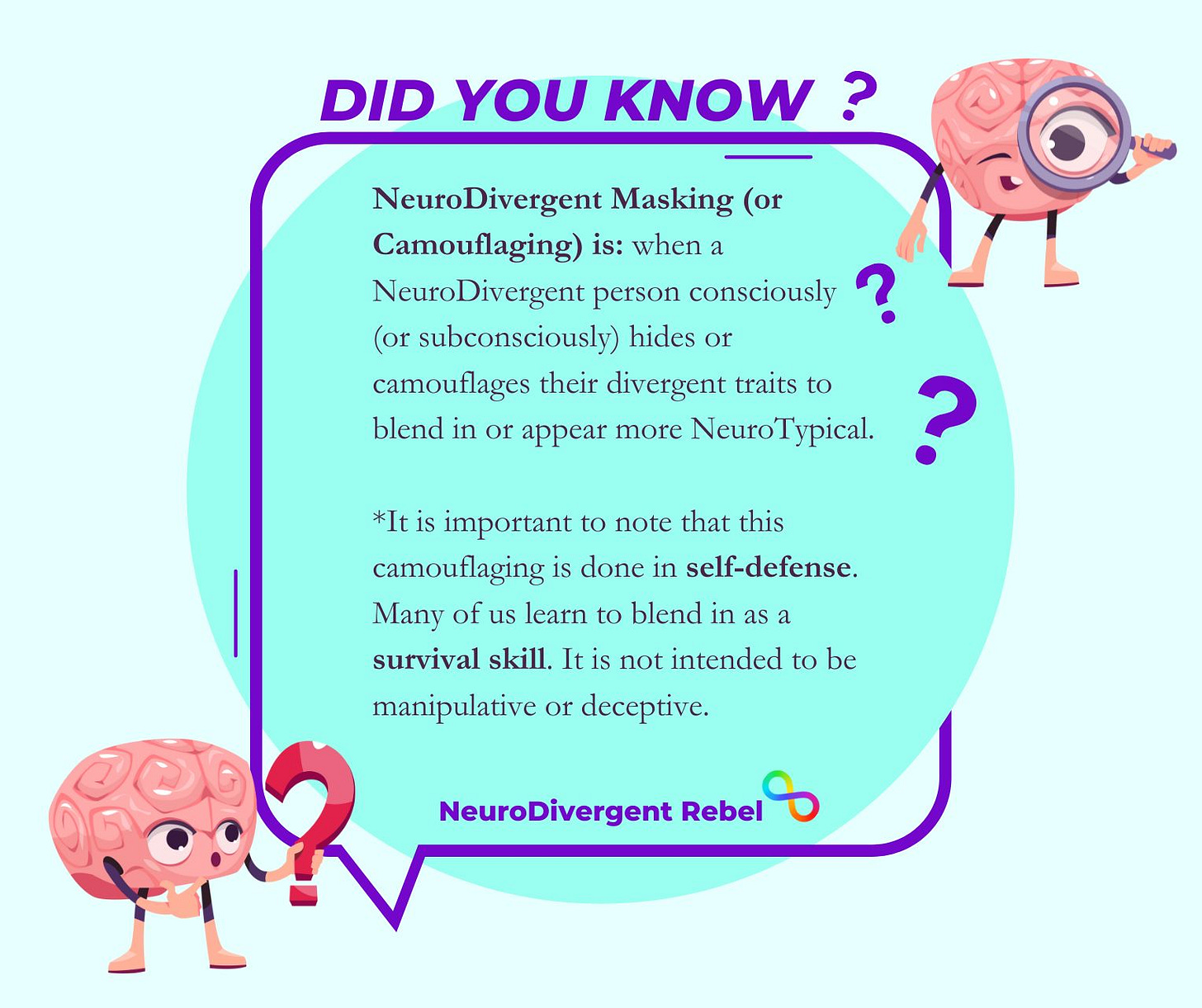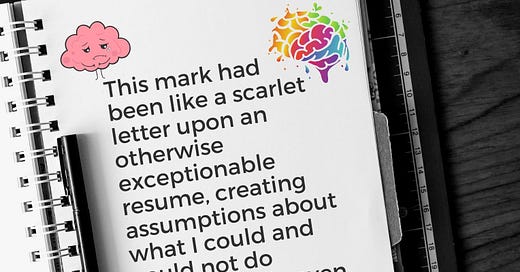Openly Autistic: Why I DON'T Recommend Disclosing an Autism Diagnosis While Job Seeking (in MOST Situations)
When I was first diagnosed Autistic, starting this blog shortly after, I was all for being Openly Autistic whenever possible (for a few reasons). However, my perspective has changed since then.
Welcome back to another Founding Member Friday!
Twice each month on Friday, I put out an exclusive post like this one (often on a more intimate and personal topic OR featuring some of the training materials I’m teaching) that will be brought to you by and for our Founding Members.
The first part of this post is always FREE to everyone here on Substack, and the ending of the post is ONLY available to our Founding Members (as thanks for the extra support they give to make this blog possible).
We currently have eleven Founding Members. I won’t put them on the spot today, but you know who you are. I can’t thank you enough for your support.
When I was first diagnosed Autistic, starting this blog shortly after (roughly seven years ago now), I was all for being Openly Autistic whenever possible (for a few reasons).
The first reason I wanted to strongly encourage everyone who felt safe enough to "come out" and be openly Autistic (or any other NeuroType) was for those who cannot hide the differences in how their minds work.
This was partly out of my own fear because, at the time of my diagnosis, my ability to mask (or camouflage) my NeuroDivergence had begun to fail me.
NeuroDivergent Masking (or Camouflaging) is when a NeuroDivergent person consciously (or subconsciously) hides or camouflages their Divergent traits to blend in or appear more NeuroTypical.
*It is important to note that this camouflaging is done in self-defense. Many of us learn to blend in as a survival skill. It is not intended to be manipulative or deceptive.

For most of my life, I camouflaged my NeuroDivergence without even realizing I was doing it.
Bit by bit, I put pieces of myself away, constructing myself to make other people comfortable (regardless of what I needed or how I felt). Anything that drew the wrong kind of attention was tuned down.
Eventually, there were so many "pieces" deemed "unworthy" that the weight of holding them all back became too heavy, and I fell apart, unable to keep carrying the weight and expectations the world had for me.
Deep in burnout (and an accompanying mental and physical health crisis), I struggled to hide my Autistic traits (as I'd been able to do for many years).
Camouflaging is hard on NeuroDivergent people for many reasons (other than the apparent problems having to hide your authentic self would cause anyone).
Camouflaging in Autistic people can have devastating impacts on us and has been tied to poor mental health impacts, such as increased anxiety, stress, and depression (which is alarming, considering that many Autistic people also have diagnosable co-occurring mental health issues and that suicide is STILL one of the top killers of Autistic people).
I had camouflaged my way into a dark place, and deciding I didn't have to keep hiding saved my life.
If I hadn't discovered I was Autistic when I did, causing me to change my direction, I would have become another statistic. I wouldn't be here to share this story with you today.
When I started this blog, I wasn't sure if I would ever recover from the state I was in (burnout) or if I'd ever be able to camouflage myself again.
It was because of this fear I wanted the world to be safe for Autistic and other NeuroDivergent People who don't have the safety that "appearing average" can bring.
People need to be accepted as they are – strengths, weaknesses, - the whole person (regardless of NeuroType).
For most of my life, camouflaging my NeuroDivergence, downplaying and hiding parts of who I am, prevented me from moving forward and getting help when needed.
In my thirties, I had to teach myself to ask for help because I had learned to camouflage my weaknesses (and sometimes my skills) instead of speaking up for my needs or sharing the ways I could shine.
It has taken nearly seven years to take my life back from the burnout and mental and physical health collapse I fell into right before my Autism diagnosis.
My camouflaging (and the complex mask I had built to conceal the multiple layers of NeuroDivergence that color my life) had been crucial elements in my collapse. It was also one of the first things that had to go so I could start recovery.
In addition to draining my energy and taking a toll on my mental and physical health, the hiding that I had done from the world had other impacts on my life (that were harder to measure).
I took a bit longer to realize how camouflaging, hiding, and putting parts of myself away (only presenting to the world what I thought people wanted to see) isolated me, leaving me surrounded by people who didn't know or appreciate the real me.
Because I thought the real me was unworthy of presenting to the world (because they annoyed and inconvenienced others), I kept that person hidden, locked up, and forgotten.
Many of the people I'd surrounded myself with (before my Autism diagnosis) were not people who would stick around after my unmasking (because they had only agreed to the camouflaged version of me) and didn't appreciate it when I could no longer (and eventually refused to) hide my NeuroDivergent traits and tendencies.
Unmasking living out loud, openly, and boldly Autistic has given me the benefit of finding others who could love and appreciate the real me (something that was impossible when I kept that person hidden where no one in the world could find them).
I "flew my freak flag" proudly, and all the delightful and wonderful people who didn't need me to hide myself found me. I badly wanted that for the many Autistic People who are lonely and isolated without a loving support system.
This is another reason I wanted to encourage people to be openly Autistic because I genuinely believed doing so could help more of us find communities and friendships with like-minded humans.
I had so much hope and optimism at the beginning of my journey (because I didn't understand back then the things I know now).
Today, I'm still hopeful but more realistic, thanks to my own experiences of the consequences that can come from being so open with my Autistic status that I can't possibly take it back.
More about my experiences and why: Though I still think people must be open with their varied NeuroTypes to decrease stigma, I advise caution when sharing this information with others (especially online) in the Founding Member section of this post.



